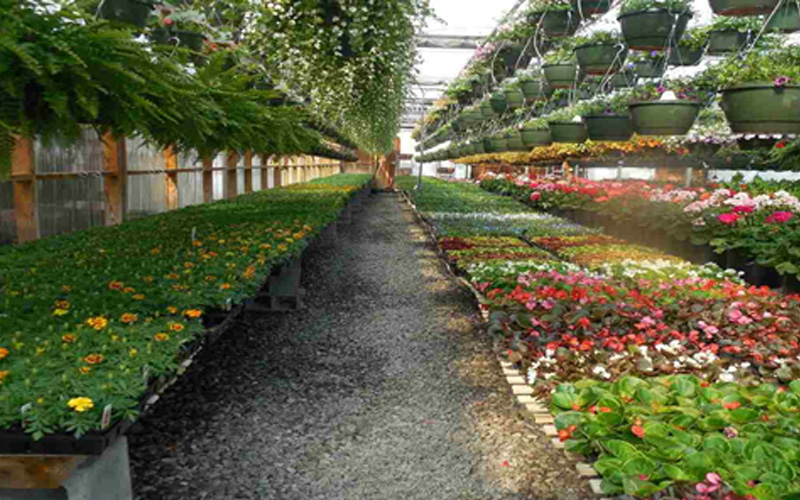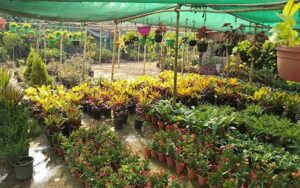Plant Nursery Business Start -up in India
Any business start up cannot start with passion and an idea only. One have to deal with many problems & challenges too. So, to cope up with the problems, one should have a high level of leadership skills with a clear understanding of the market, excellent communication skills, maturity to see things in the right perspective along with the ability to take calculated risks are required on the part of the entrepreneur.
1. Why Plant Nursery?
If you love gardening and love to be surrounded by flowers and plants or want to live your life in a beautiful environment with the a sufficient amount of earning than Plant Nursery business is a wise idea to go with. Over the time plant nurseries has established itself as a profitable business plan due to its growing demand. The competition is always higher for any business, but if one believe in only concern of quality, then everything will fall into its place.
2. What is a Plant Nursery?
A nursery is a place, where seedlings, saplings, trees, shrubs and other plant materials are grown and maintained until they are placed in a permanent place. Mostly the plants concerned are for gardening, forestry or conservation biology, rather than agriculture. They include retail nurseries, which sell to the general public, wholesale nurseries, which sell only to businesses such as other nurseries and to commercial gardeners, and private nurseries, which supply the needs of institutions or private estates.
3. Types of Plant Nurseries
On the basis of business, size, area, plant type. etc. too many categorizations of plant nurseries are there but as here we are sharing you the basic Plant nursery concept we categorise plant nursery into following only
1. Vegetable Nurseries
2. Flower Nurseries
3. Fruit Nurseries
4. Medicinal Nurseries
5. Forest Nurseries
1. Flower Nurseries
This is one of the most common and beautiful nurseries that one can plant on a piece of land. By having a Flower nursery, you do not just contribute to the beauty of nature and catch people’s hearts with the beautiful flowers, but you also earn by selling them, as flowers are in huge demand in the market. If you are growing rare and high-demand flowers in your nursery, this would scale your sales.
2. Vegetable Nursery
We all know the adverse effects of consuming vegetables that are infected with pesticides and insecticides. People have been shifting to vegetables that are grown on organic farms or through any organic means. They are healthy to consume and hence they are also in great demand.
3. Fruit Nurseries
Next in line is Fruit Nurseries, it is the most popular type of Nursery that is opted by many business owners. The quality of fruits grown in organic land or rather nurseries is way higher than those grown on regular farms. It would require of you to have good patience and continuous care for maintaining these nurseries, however, the returns that you receive at the end are totally worth the efforts.
4. Medicinal Nurseries
Needless to say, with the increasing diseases and the awareness as well as need of medicines, having a medicinal nursery can also be helpful for people fighting with life-threatening diseases. Medicinal ingredients such as Aloe Vera requires such Organic land or Nurseries for emerging to their full extent. This is currently the most profitable Nursery which businesses go for.
6. Forest Nurseries
In these types of nurseries, saplings are grown, which in the future will turn into large trees. Trees such as eucalyptus, pine, oak, teak are grown in forest nurseries. One can decide on picking one or more of the above types depending on available land and resources.
4. Basic Requirements for Starting a Plant Nursery in India
1. Land
This is the most crucial aspect of your business which would require your extra attention. The land is the basic criteria that would decide the credibility and the quality of your nursery and the content that it grows. You need good fertile land, which suits the type of nursery that you are planning for. You can either rent the required agricultural land, or if you have enough space in your backyard or some area of your own, you can opt for the same. For land to be considered for a nursery there should be moisture, nutrients, devoid of insects, and so on. Further one shall have few following temporary structures to maintain nursery
Store-house
A store house is necessary for storing implements, fertilizers, sprayers and nursery stocks such as seeds, bulbs, corms, cuttings etc.
Along with the store-house, potting and packing shed is constructed for the purpose of packing of nursery stocks and for potting during rainy season or hot weather. The length and the breadth of the shed will depend upon the volume of work and available land piece.
Nursery Beds These are raised boxes made of brick and mortar, provided with drainage holes at the bottom. The dimensions of the boxes are 60 cm high, 120 cm broad and the length may be as required but preferably not exceeding 10 meters. The boxes are first filled with broken bricks and crocks for drainage and the top layers are filled with sterilized soil or compost.
2. Agriculture License
Nursery plantation is an agriculture unit, and an agriculture license is required to get started. One can visit government websites for further information and procedures. A local government authority might also be needed for inspection to your nursery.
3. Seed & Saplings
Needless to say, if you are growing vegetables or fruits, or some medicinal properties, you would require seeds and saplings of the respective plant. Your techniques of acquiring the same would matter and affect the quality of the end product ultimately.
4. Tools and Equipment
You cannot utilize your nursery to its fullest capacity without having the right equipment and tools at your disposal. Some basic tools such as hammer, Pavra, scissors, and so on. These very tools would be useful for all the daily activities that you carry on.
5. Manpower
You would need some people to help you with all the daily activities that go on in your nursery. The number of people would depend upon the area of your nursery.
6. Add-ons
Add-ons are usually the pesticides and insecticides that you can use on your plant nursery for protecting them from insects and termites. However, this would not be applicable if you are planning for nurseries that are organic in nature instead of any additives. The Chemicals that you select should be known to you or at least preferred in the market. The best way to go about the same would be to observe and consult other Nursery owners.
7. Marketing your Plant Nursery
As always, you would need promotion and marketing to have your Plant Nursery known among the businesses. The best option would be to have a website built up related to your Plant Nursery. Having your Plant Nursery’s social media handles would also be very impactful.
5. What are the skills required to initiate a business of plant nursery
1. One must know about the plants beforehand. It is a very important thing when proceeding with proper development of the plant.
2. Various plants require various irrigation, climates, rubbing, manure, as well as weeding. Therefore, if you are concerned about booming in this business, then you must take some training. Concurrently, you can get hold of any experienced gardener too.
3. As a matter of fact, the entrepreneur shall have the capabilities of buying different kinds of essential equipment for cultivating the plants, for e.g. irrigation, compost, temperature control, harvesting, and more.
4. One must be acquired with the important information about pesticide as well as plant diseases. One must also use the pesticides effectively.
5. In order to initiate the plant nursery business, one must consider the specific information on mixing the mechanical skill like plumbing, the irrigation method, greenhouse ventilation, and more.
6. Starting the plant nursery business would require certain marketing as well as administrative skills. Besides, one needs to invest a lot of time in the land such that it becomes financially strong.
6. Source of Funding
Most startups usually begin with high hopes and investor confidence. However, a few circumstances can either make or break any business startup. Here are a few options one can adopt, in order to source the required funding for a startup.
Bootstrapping: Utilizing personal saved up funds or funding from friends and family and only works for small-scale enterprises.
Crowd funding: Platforms are set up for individuals to pitch their business ideas or challenges to a community of investors or people willing to support their ideas or cause.
Angel Investment: People with a huge amount of capital and are willing to invest it on over the edge business ideas and provide lower investment capital to business ideas compared to venture capitalists.
Venture Capital: Professionals with an emphasis on searching firms with great opportunities and pursuing large companies with established stable levels and recognisable staff handle funds.
Business Incubators and Accelerators: Business incubators nurture business while accelerators fast-track businesses. Bengaluru156 Mumbai100 NCR-Delhi– 188 Hyderabad- 16 21 Pune-27 ChennaiAhmedabad12 Jaipur11 Indore-2Siliguri-2 Kanpur-3 Vadodara3 Chandigarh2 29
Winning contests: The source for funds is through engaging in competitions or contests that require entrepreneurs to display or pitch their business module against other competitors vying for the same funding for their businesses.
Bank Loan: Banking institutions provide financial backing on loans to individuals who approach them with a solid business plan. The financial provision of banks is in two forms, they are working capital loan and funding.
• Working Capital Loan: Designed to traverse one full cycle of revenue generation. Stocks and debtors usually have an advantage on the limit.
• Funding: Providing the business plan and concise information of the valuation, alongside the project report on which the loan was sanctioned.

Microfinance Providers or NBFCs: Give access to capital to small-scale entrepreneurs that lack access to conventional banking capital or loans. Government Programs: Funding from the government is usually substantial in size, thus providing one with surplus capital to manage the startup and the process of scrutiny, approval and eventual release of funds may take a lot of time due to government bureaucracy. Product Pre-Sale: Builds consumer confidence in your brand and allows you to size up the demand for your product before its official launch.
Selling Assets: Doing away with assets in your possession that have high financial value, can effectively serve as an immediate source of funding for the startup.
Credit Cards: Business credit cards are an instant source of funding. New businesses that incur heavy expenditure can utilize credit cards as long as they fulfill the minimum payment requirement (Anonymous, 2018), (Cleartax, 2019), (Jennifer Post, 2018), (Team Tech Panda, 2013)
7. Nursery Registration and Accrediation
Agriculture Minister Narendra Singh Tomar launched a ‘National Nursery Portal’ on13th April 2021 to connect nursery operators with consumers and to get their nursery registered and accredited.
Features of the Nursery Portal
1. Registration of Nurseries/Buyers
2. Directory of Accredited/Licensed/Other Nurseries in India
3. Platform for Nurseries to showcase their profile
4. Posting Sell Offers by Nurseries
5. Posting Buy Enquiries by Buyers
6. Virtual Aggregation / Match-Making between Sell Offers and Buy Enquiries
7. Communication platform between Nurseries and Buyers
8. Knowledge dissemination – Nursery Assistance & Guidance
9. MIS Reports for Government Departments for policy planning
The above workflow for Nursery Portal is described below:
1. The Nurseries/Buyers will register themselves using the online registration form on the Portal.
2. The Nurseries will be able to update their profiles online including availability of Planting Material stock.
3. The Nurseries will be linked with rating system and/or with State Governments. This will allow the buyers to make informed decision about the quality of the produce procured by them from the Nursery.
4. The Nurseries will be able to post sell offers to Buyers registered in the Portal
5. The Buyers will be able to post enquiries in the Portal.
6. Portal will match the Buyer’s enquiries with Nursery’s sell offers automatically.
7. Nurseries and Buyers will be able to exchange messages using the portal.
8. A feedback feature will allow the Buyers to record their experience of using the services provided by the Nurseries through the Nursery Portal.
The National Nursery Portal, developed by the National Horticulture Board, helps consumers to connect with nurseries and get information about the availability and prices of quality planting material. It also help nursery operators in assessing market demand for their products.
The portal tells you where your nearest nurseries are, give you access to them and provide information about the plants, their availability, the price, etc.
The online digital platform for nurseries was set up so that farmers/ other stakeholders could access relevant information on plants available in their vicinity. Through it, nursery operators will be able to display their profiles and put up sales offers, and the buyers will also be able to enquire directly online about their own requirements.
It is a Digital Platform in the form of a Web Portal and a Mobile Application, which intends to create an online market place where Nurseries and Buyers can interact and sell or buy planting material.





















